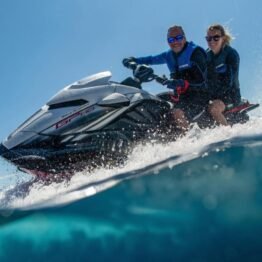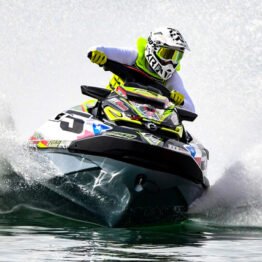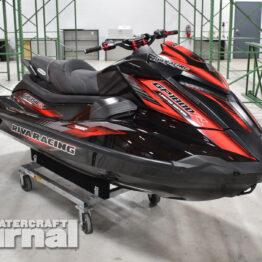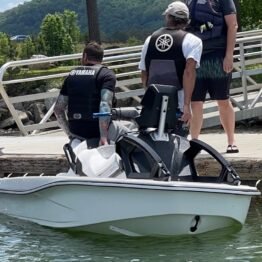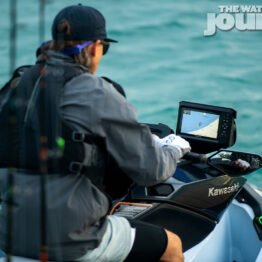
It would probably be fair to say that one of the last things Yamaha wants to see is a PWC rider panicking or being in distress. But according to the latest list of U.S. patents issued, Yamaha is working on being prepared for that eventuality – just in case.
According to a US Patent for a “Rescue Network System for Watercraft,” filed for in February 2021 and granted last month, Yamaha is working on a system of receivers and transmitters that would be built into PWCs, allowing emergency communications between PWCs.
 In stating the issue the Rescue Network System attempts to resolve, the patent states, “An operator of a watercraft, when encountering some kind of trouble during navigation, informs another watercraft navigating nearby of the occurrence of an emergency by using a tool such as a whistle, a smoke marker, or so forth. Alternatively, the operator calls for a rescue service by using a communication means such as a mobile phone. However, in order for the operator of the troubled watercraft to successfully inform the other watercraft of the occurrence of the emergency by using the tool, it is premised that the other watercraft is located at a distance nearby enough to fall within the field of view of the troubled watercraft.
In stating the issue the Rescue Network System attempts to resolve, the patent states, “An operator of a watercraft, when encountering some kind of trouble during navigation, informs another watercraft navigating nearby of the occurrence of an emergency by using a tool such as a whistle, a smoke marker, or so forth. Alternatively, the operator calls for a rescue service by using a communication means such as a mobile phone. However, in order for the operator of the troubled watercraft to successfully inform the other watercraft of the occurrence of the emergency by using the tool, it is premised that the other watercraft is located at a distance nearby enough to fall within the field of view of the troubled watercraft.
“Because of this, the method of informing the other watercraft of the occurrence of the emergency by using the tool is not suitable for a place with low marine traffic or a place with poor visibility due to complicated terrain. In calling for a rescue service, the operator of the troubled watercraft is supposed to wait for the arrival of a rescue team from a far-away base, which takes a considerable time for the operator to be rescued. Incidentally, when a watercraft of an acquaintance happens to pass nearby, the operator of the troubled watercraft can be quickly rescued by making a phone call for rescue to the acquaintance watercraft. However, such a situation seldom occurs.”
 The patent information continues, stating that the patented system will be able to transmit and receive distress signals between watercraft such that the troubled watercraft is able to be quickly rescued even without another watercraft being located close enough to be within field of view of the transmitting watercraft.
The patent information continues, stating that the patented system will be able to transmit and receive distress signals between watercraft such that the troubled watercraft is able to be quickly rescued even without another watercraft being located close enough to be within field of view of the transmitting watercraft.
In preliminary proposals of the system as patented, Yamaha describes a network that would include transmitters and receivers built into PWC. Once a “panic button” or other mechanism is activated on the watercraft experiencing an emergency, a signal is activated that is received as a sound or voice alert by any nearby PWC equipped with the network receiver. The initial alert would be followed by a digital message or GPS-based location of the transmitting PWC. A responding PWC operator would also be able to transmit a message to the transmitting PWC advising that assistance is on the way.

There was no apparent designation of the range of the emergency transmission/reception, other than to specify that it was beyond sight distance.
A review of the diagrams and notations included in the patent file suggest that the network would also be able to detect if a PWC came to an abrupt stop or capsized, indicating a crash, and would then send out an automatic distress call without the direct activation of the panic button by a rider. The system, as described and diagrammed in the patent, includes a position sensor to provide the transmitting watercraft’s GPS data to the receiving PWC.
No indication of a proposed timeline for the production of the patented system was included in the patent documentation on file with the US Patent and Trademark Office and no press release on the proposed system has been issued by the company.



